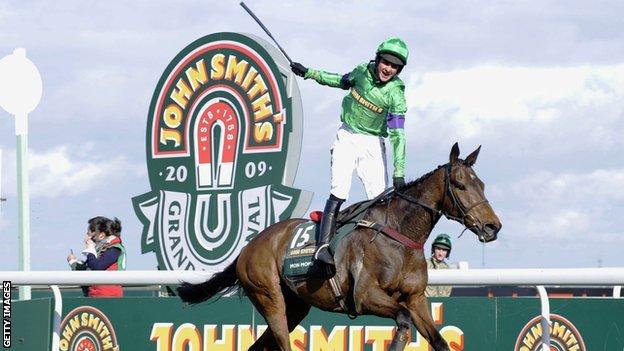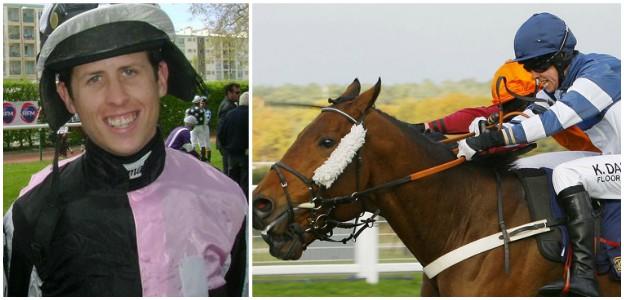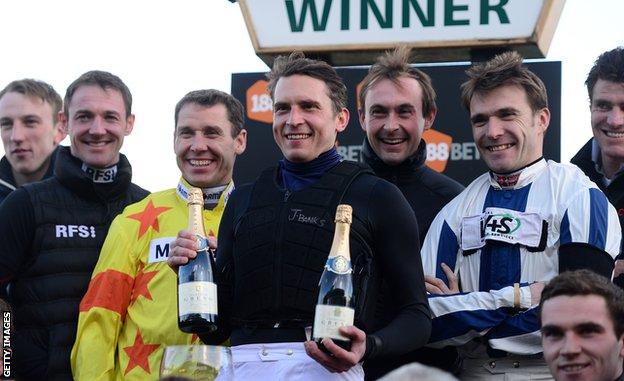
[ad_1]

Warning: This article contains distressing content.
As one year started, he was billed as a face for the future. Twelve months later, he was finished with the sport and had twice tried to end his life.
That was the brutal reality for jockey Kevin Tobin as his dream career collapsed, a series of minor setbacks creating a damaging domino effect.
He is talking now after emerging from that “dark place” to help shine a light on the issues that can cause a breakdown.
“I now understand that my sorrow is not permanent,” he says.
Losing races, weight battles, social media abuse, travel, isolation and pressure are all factors in horse racing. They are in sharp focus after a series of tragedies this year.
Michael Curran punched the air with delight as the horse he looked after, Golden Horn, won the Derby at Epsom five years ago under Frankie Dettori. Curran was found dead at stables near Newmarket in May 2020.
Friends said jockey James Banks lit up the room. A charmer, larger than life. Yet he went bankrupt, lost his house and took his own life.
Liam Treadwell was a pall bearer at his funeral in February. Treadwell had won the Grand National at Aintree 11 years earlier but a series of falls caused cumulative concussion. He openly discussed his mental health issues. Last week, mourners lined the street after his death at the age of 34.
Different lives, different stories, difficult times. Questions will remain, even after any inquests have concluded.
A wider question faces horse racing as a whole: does the sport have a mental health problem? And, if it does, what can be done about it?

“Liam Treadwell was a special human being. He was the most kind, gentle character – he had no side to him. No-one would have said a bad word about Liam Treadwell and he wouldn’t have said a bad word about anyone else.”
The words of Charlie Poste, who began his riding career alongside Treadwell.
‘Treaders’, as he was affectionately nicknamed, made headlines around the world when winning the Grand National at Aintree in 2009 on 100-1 outsider Mon Mome.
His gap-toothed smile prompted a joke from BBC TV presenter Clare Balding that led to a free dental makeover. The popular jockey, a gifted sportsman once talent spotted by Arsenal Football Club, had won his sport’s most famous race. Life was good.
Eight years later, he spoke of difficulties after suffering concussion in falls.

“There was this Liam creeping into my life that I didn’t know and I didn’t understand what was going on,” he said.
The interview was one of several in a series – put together by the Jockeys’ Education and Training Scheme – which covered a range of issues.
Racing has the highest concussion rate of any sport in the world. Careers are often ended by injury, and former jockeys are more than 2.5 times more likely to suffer from anxiety or depression as the general population – according to a joint Oxford University and British Horseracing Authority (BHA) study published late last year, one of several commissioned by the governing body.
Riders share much between them. The routine, the rush of adrenaline, the risk. In racing, camaraderie is there. But so is the competition. It is fierce, and individual. It can be a lonely place.

Ferry from Ireland, up the M4, turn off, big sign – Lambourn: Valley of the Racehorse.
“I remember thinking: ‘I’m in heaven, all my dreams have come true,'” recalls Tobin of his 2004 journey from Tipperary to Berkshire.
After riding ponies as a schoolboy, all he wanted to do was “jump higher and go faster”. He learned his trade with top Irish trainers Jessica Harrington and Henry de Bromhead and secured a job in England with Charlie Mann.
“Looking back, everything was so fast – the horses you were riding, the cars you were driving, the relationships you had. Everything came and went,” he remembers.
Tobin’s profile increased after winning the Hands and Heels series for young jockeys and he was featured in the Racing Post.
“It was rather complimentary but noted I was ‘not the most stylish’ and that’s all I kept seeing,” he says.
“Then something happens – you get a hole in your boat and don’t really know how to fix it. It might be losing a ride in a big race or getting a telling off from a trainer. It all starts to add up.
“I was beginning to spiral into a darker place and for a time I had zero joy in racing.”
When Tobin looked around the weighing room, he saw champions like AP McCoy and Ruby Walsh and knew he would never reach those heights.
“Racing’s uniqueness is glaring. I won a little bit but was vulnerable to being envious,” he says.
“When four of us were in the car driving to Ludlow on a Thursday, deep down I was really hoping the three of them didn’t win. All those lads in the car finished their careers early.”
In a risky game of individual winners, losing is ever present. When legendary 20-time champion jockey AP McCoy retired in 2015, he was hailed for a record-breaking career.
“I rode 4,357 winners, but I rode 14,000 losers too,” he remarked. His winning percentage of about 25% may have been among the best, but he lost most of the time.
Tobin believes jockeys need to be better equipped for dealing with defeat.
“If everything you do in your preparation – studying the form, diet – is geared up for the best chance of winning, what happens when you lose?” he says.
When Tobin first considered quitting, he feared the future more than his increasingly miserable present.
“I was afraid to stop because it was so much of my identity – I introduced myself as a jockey. I’d allowed all these things to define my self-worth,” he says.
“I didn’t quite know where to look. What does help look like? I couldn’t tell my father because he enjoyed it so much.
“I had become the villain in my own world. I felt I was a burden or bringing the fun down. I despised who I was. I didn’t care how I looked, whether I was shaven or my boots were clean.”
Tobin went to Catterick races and really wanted to fall and get injured. He finished fifth.
“I didn’t necessarily want to die but I wanted the circle to stop,” he says. “I decided that suicide was an option. I was putting my plan together about how I was going to die that night.”
A chance call from his father stopped him. It saved his life, and changed it.

Tobin returned to his family in Ireland, saw a counsellor and slowly began rebuilding. He is happy now in the United States, training to be a counsellor himself.
“I had to get out or I wouldn’t have survived,” he says.
“I now have the capacity to embrace these moments of enjoyment while they’re there. I understand that sorrow is not permanent.
“One of the most valuable things I learned is emotional intelligence. Knowing what it is I’m feeling, say envy or jealousy, and realising it’s not healthy and processing it. Controlling what I can control and understanding that losing isn’t going to define my work.”
Tobin believes exit interviews could be valuable in helping other riders and makes a plea to trolls who abuse those in racing on social media.
“I do think that’s a contributing factor to people’s mental health,” he says. “When we’re not looking at somebody face to face or speaking to somebody over the phone, we tend not to really care about the consequences of what we’re saying or writing. That’s a major change that has happened in the past 10 or 15 years.
“I’d say this to the general public. Look yourself in the mirror before you write that message and ask if your son or daughter, brother or mother were to read it, would you still be okay with it? If the answer is no, or even maybe, it might not be the best thing to write. Quite often the sole objective is to hurt or wound.
“I’ve ridden with broken bones – you don’t want to miss a winner, or an opportunity. It’s a highly competitive, ruthless business where there’s not always stacks of loyalty.
“It’s a losing sport. You spend the majority of your career losing. It’s very tough mentally and riders are often the first people to blame. You are under constant pressure to get it right.”

Banks and Treadwell were jump jockeys, often hailed for their bravery amid injuries in a sport where riders are followed by an ambulance for every race.
Poste wonders if perceptions need to change.
“Every champion jockey is portrayed as being made of iron. It’s almost like tough people don’t admit to their problems or, if they do, it might affect their careers,” he says.
It is a point not lost on Lisa Hancock, chief executive of the Injured Jockeys’ Fund (IJF), whose staff have the heartbreaking job of supporting families hit by tragedy.
“We want to build into the psyche of jockeys and their own awareness of mental wellbeing. We need to make mental health part of the overall package,” she says.
“Resilience is a word I quite like. A steely core, but willing to listen. The mental wellbeing of people in our sport is a very high priority. While we do quite a lot, and some really good stuff, we can obviously look to improve what we do. What we do is good, but of course we can do more. Problems are often complex and deep-rooted. It’s not easy.”
The IJF plans to extend psychological services at its three rehabilitation centres, while recognising that people have to want to be helped first. It has hired Dr Duncan Law, a consultant clinical psychologist from the Changing Minds organisation.
He says: “Toughness can be seen as you just get on with it. There is also a toughness in acknowledging and showing vulnerability. It’s sometimes a hard thing to say: I am struggling with this.
“It is still a male-dominated sport, and men are not the best at talking about their emotions. In certain macho cultures, talking about your feelings is taboo.”
Law worked in the NHS for more than 25 years and has helped Premier League football clubs and Olympic sports. He says educating people who deal directly with athletes can help – for jockeys this could be their valet or physiotherapist.
“What we don’t want is valets to become mini therapists – that’s not their role,” he adds. “If you are feeling low or depressed, your motivation to do anything can be reduced, so it’s important to have people that can link you in to help.”
Josh Apiafi, a former chief executive of the Professional Jockeys’ Association (PJA) suggests offering psychometric tests to assist with future careers, and the continued tracking of riders’ welfare in retirement. He has also called on racecourses to offer free admission to former jockeys who have held a licence for at least two years.
“I know jockeys who have ridden plenty of winners and they’re having to ring round the trainers to get a badge,” he says.
There are scores of people who have been helped through various initiatives, including those of the PJA and Racing Welfare, which both run 24-hour helplines. The BHA, which governs horse racing in the UK, works closely with Racing Welfare and is committed to making further progress on mental health support.
But while phone lines help some, they may not work for others.
Treadwell had been supported by racing organisations and colleagues. He had opened up about his problems. Many thought he had turned a corner.
After his death, Poste met up with some riders to see if anything could be improved. The post-lockdown world of racing has limited jockeys to competing at one fixture a day, rather than afternoons and evenings.
“A few of the lads said how refreshing it was to be restricted to riding at one meeting. If that had been suggested pre-Covid, there would have been uproar,” he says.
“Whenever there is racing, people will never take a day off and not for their mental wellbeing.”
Poste also echoes calls for former riders to be used as ambassadors who can be available to talk to the current generation.
He adds: “It’s a good suggestion to train the valets and the inner sanctum. Riders are becoming better at knowing people who are struggling. The more you can talk, the less of a taboo it is. This shouldn’t be seen as a stigma. It is part of your fitness, your mental fitness.”

Modest, polite, funny, kind. That’s how Treadwell’s friends and family spoke of the jockey at his funeral last week.
This from his mother Lorraine: “Our lives were richer for Liam being there. My beautiful, kind, caring son. Liam, the light of my life. And I’ll end as I always do. Love you squillions. Mum.”
Racing knows it must look ahead, while remembering those who have been lost.
[ad_2]
Source link